Trump's $4.1tr budget takes hatchet to safety net
- Published
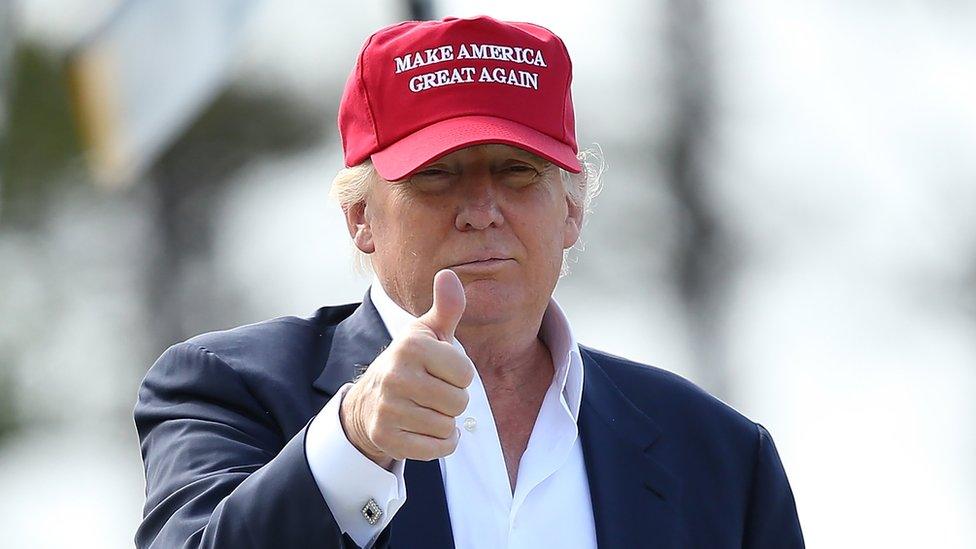
The White House has unveiled a $4.1tr (£3.1tr) budget that would take the axe to the social safety net for the poor.
The plan would sharply slash food stamps, healthcare for low-income patients and disability benefits, and eliminate student loan subsidies.
The budget also features an Ivanka Trump plan for paid parental leave.
The US military would receive a 10% boost while $1.6bn would be allocated for a wall on the border with Mexico.
President Trump, who is travelling overseas, missed the unveiling of his first full budget, titled A New Foundation for American Greatness.
Mick Mulvaney, the White House budget director, told reporters on Tuesday the proposal is "simply the president's priorities put on paper".
Is the president's budget law?
No. A US president's annual budget is a policy wish list that stands little chance of being enacted.
The Senate and House of Representatives will pass their own versions, which will then go to congressional committees before the final spending plan is cemented.
The Trump budget might have expected a sympathetic reading in the Republican-controlled Congress.
But even fiscally hawkish conservatives are baulking at some of the $3.6tr in cuts.
How US defence spending plan compares to allies and rivals.
What about these cuts?
Critics say the plan would hurt some of Mr Trump's supporters hardest.
Its proposed $190bn reduction in food stamps surpasses previous cuts put forward by Republicans to a programme that serves about 42 million people
Representatives from agricultural states are objecting to a plan to limit farm subsidies
Mr Trump promised on the campaign trail not to cut Medicaid, the healthcare programme for the poor, but his budget would cut the scheme by $800bn
Republicans are also squeamish about proposed cuts to Meals on Wheels, which provides food to the homebound elderly, disabled and veterans
But the funding cut to family-planning groups that offer abortions, such as Planned Parenthood, is likely to be welcomed by conservatives
The White House budget director said: "Yes, you have to have compassion for folks who are receiving federal funds, but you also have to have compassion for the folks who are paying it."
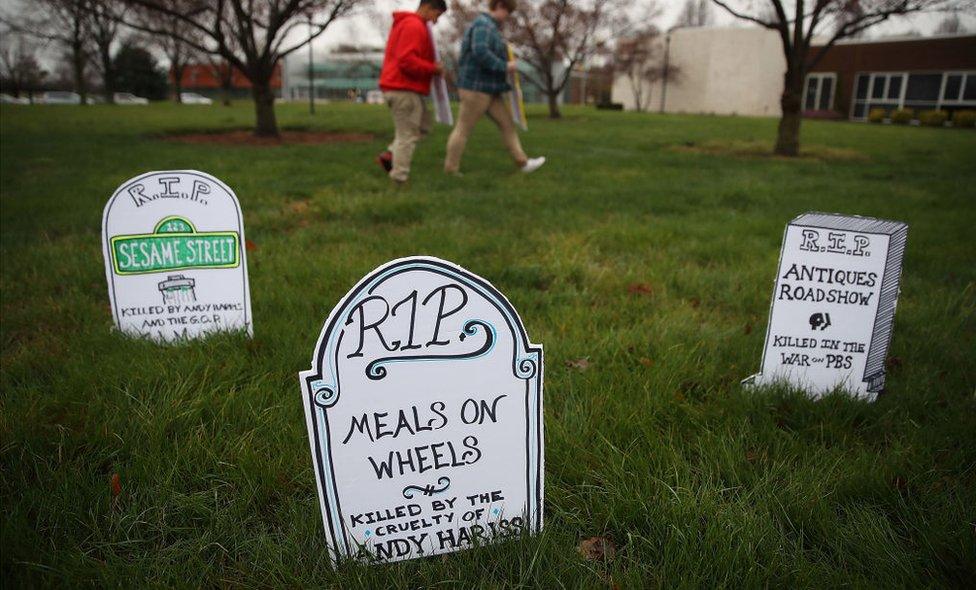
Protesters at a Republican congressman's town hall meeting laid out gravestones for Meal on Wheels and popular public broadcasting programmes
What's the Ivanka plan?
The US is the only developed country that does not grant new mothers or fathers a single day of paid time off.
But the US first daughter, who also acts as assistant to the president, has championed a policy to change all that.
Ivanka Trump's $19bn plan to offer six weeks of paid leave to mothers and fathers makes this the first Republican administration to put forth such a proposal.
But congressional Republicans are unlikely to rubber-stamp a new government mandate.
And even Democrats, who have long cried out for such a benefit, may be reluctant to lend their support to this president.
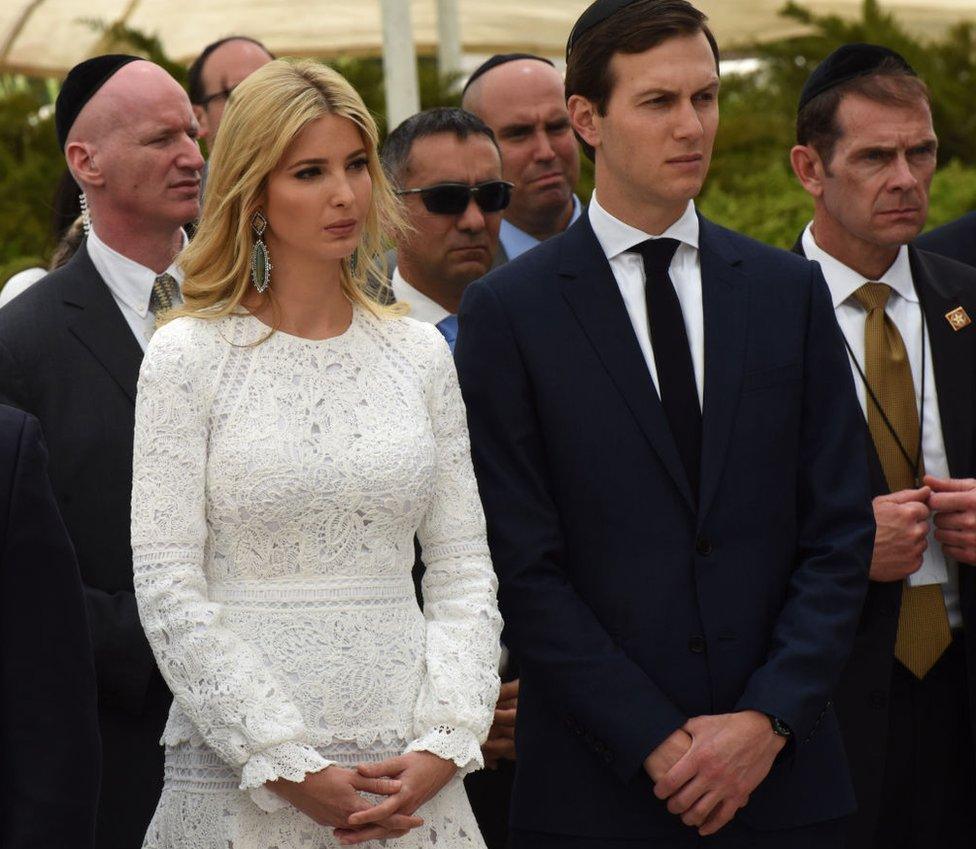
Ivanlka Trump (L) and her husband, Jared Kushner, are on an overseas trip with the president

So far to the right: Analysis by Anthony Zurcher, BBC Washington
This proposed budget should be seen as a presidential statement of principles - and those principles often run counter to the ones Mr Trump campaigned on last year.
The defence spending boost is there, yes, but funds allocated for a border wall aren't nearly enough to realise Mr Trump's dream. Infrastructure spending is below the massive investment Mr Trump promised.
Candidate Trump also pledged to protect entitlement spending, but his budget makes massive cuts in the Medicaid healthcare programme for the poor.
There was always going to be some conflict between Mr Trump's campaign guarantees and reality, but this budget more closely resembles the agenda of the most aggressive Republican fiscal hawks.
The budget will have some support in Congress from hardliners, but it would have been difficult to imagine during the heat of the campaign that President Trump would start so far to the right.
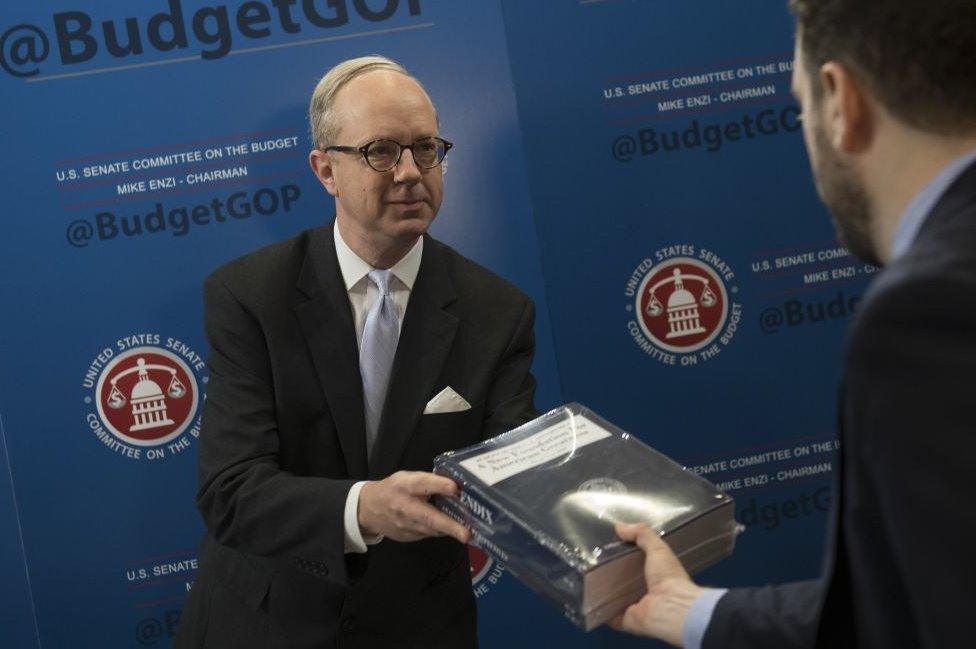
Senate Budget Committee Chairman Eric Ueland hands out the budget proposal to colleagues

Is the plan economically viable?
This budget projects the US government will eliminate its deficit and be running a surplus by 2027 - for the first time since the 1990s.
The plan promises to cut tax rates, relying largely on hoped-for economic growth of 3% to avoid adding to the deficit.
But that forecast is well beyond the independent Congressional Budget Office assumptions of 1.9% growth.
The Committee for a Responsible Federal Budget, a bipartisan policy body, said the Trump budget is based on "rosy assumptions" and "does not add up".
The White House budget director said on Tuesday 3% growth "will be the new normal for this country", but conceded that without it, the "budget will never balance".
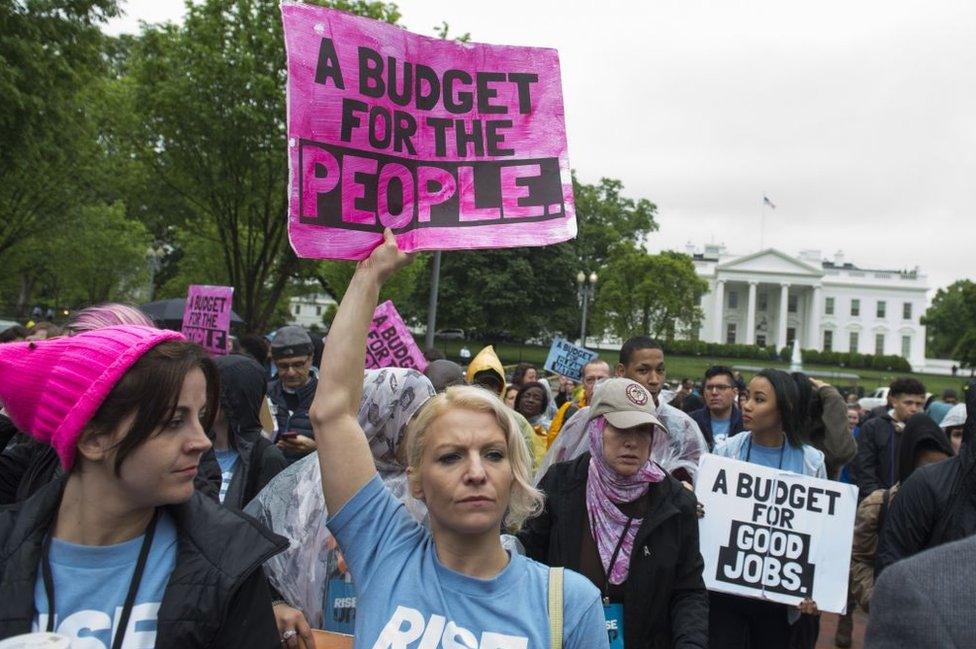
Protest's against President Trump's budget began weeks ago
What's the reaction?
Democrats are predictably outraged.
Hillary Clinton said the Trump budget shows an "unimaginable level of cruelty" for millions of Americans and children.
Yet even conservatives are voicing anxiety about the magnitude of the cuts.
Mark Walker, chairman of the spending hawks in the Republican Study Committee, told the Washington Post: "There will be some concern if we go too deep in some of these areas."
Mark Meadows, chairman of the hardline House Freedom Caucus, told the New York Times: "Meals on Wheels, even for some of us who are considered to be fiscal hawks, may be a bridge too far."
John Cornyn, the second ranking Republican in the Senate, said the plan was "dead on arrival".